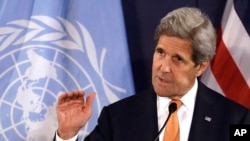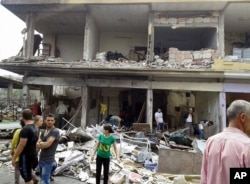Secretary of State John Kerry is seeking to dispel the notion the U.S. has lost traction in its efforts to counter the Syrian regime because of Russian airstrikes that have been aimed at taking back territory from rebels .
“The United States of America always has leverage,” said Kerry in a Tuesday news conference following the multi-nation International Syria Support Group (ISSG) meeting.
Kerry appeared slightly irritated by a question on whether the U.S. was losing the ability to exert pressure on Syrian President Bashar al-Assad’s regime to fully comply with agreements — including full adherence to a cease-fire, support of talks on a political transition and allowing unrestricted access to besieged areas for humanitarian aid.
Kerry said if Assad had reached the conclusion there was no “Plan B,” then he had come to a conclusion that was “totally without any foundation whatsoever.”
He said the greatest leverage was the fact that Assad and his backers would never be able to end the war in Syria if they declined to negotiate a political settlement.
In the joint news conference with Russian Foreign Minister Sergey Lavrov and U.N. Syria envoy Staffan de Mistura, Kerry spelled out measures the ISSG had agreed on to help reduce violence and spur the delivery of humanitarian aid.
He said the group agreed that if a party to the cease-fire persistently violated the truce, they could be excluded from the agreement.
Initial cease-fire
When the cessation of hostilities went into effect in February, it initially brought a dramatic drop in overall violence, but that progress has slowly eroded.
The U.S. and Russia are co-chairs of a cease-fire task force that has been monitoring violations.
Kerry also said beginning June 1, if relief workers were denied humanitarian access, the World Food Program would make arrangements to accelerate airdrops and regular flights into designated besieged areas. There have been complaints the Assad regime has blocked humanitarian access to some areas.
Also, the group urged all rebels to disassociate themselves from Islamic State and al-Nusra Front terrorists. Lavrov said there had been instances in which the terrorist groups had made alliances with groups that are part of the cease-fire.
Earlier, de Mistura indicated he would await the outcome and results of the ISSG meeting before moving to announce a date for the next round of political talks between the Syrian government and the opposition. He declined to do so on Tuesday, however, citing several factors, including the start of Ramadan in early June.
The U.N. has pushed the goal of finding a negotiated political settlement to the conflict that has left hundreds of thousands of people dead and millions more either as refugees or displaced within Syria.
One major sticking point is the fate of Assad, whom the U.S. and other Western powers want to step down. Assad and his ally Russia have resisted the idea.
The ISSG should keep pressing for a comprehensive political solution, said Perry Cammack, a Middle East analyst at the Carnegie Endowment for International Peace.
"Make it clear that there is no give in the demand that Assad not be around at the end," he said.
Supporting Libya
Monday, the focus in Vienna was on Libya with world powers saying they will back the country's new government in its bid to lift a U.N. arms embargo. The move could help the government combat internal security threats and fight Islamic State. Kerry announced the decision following a multi-nation meeting chaired by the United States and Italy.
The internationally recognized Government of National Accord is facing challenges from rival factions and Islamic State-affiliated militants who have established a base in the central city of Sirte and have used that base to launch attacks in neighboring Tunisia.
In a joint news conference Monday, Libyan Prime Minister Fayez al-Sarraj described the situation in his country as "bad" in terms of security and the economy.
He urged world powers to provide additional training and equipment for Libyan forces, saying Libya's neighbors would not be "spared" if terrorism grows inside the country.
Stabilizing Nagorno-Karabakh
Another focal point Monday was a multi-national effort to help stabilize Nagorno-Karabakh, an ethnic Armenian enclave within Azerbaijan that was the scene of intense fighting in April.
Armenia and Azerbaijan accused each other of violating a cease-fire.
Monday's sessions were the first time the presidents of Armenia and Azerbaijan had met since the flare-up.
The U.S., Russia and France serve as co-chairs of the OSCE Minsk Group, which has been working to find a peaceful solution to the Nagorno-Karabakh conflict.
In a joint statement, they said the presidents of Armenia and Azerbaijan had agreed to finalize plans for an investigative mechanism within the OSCE "in the shortest time possible" and to meet again next month to work on resuming talks on a comprehensive settlement.
Kerry is on a two-week trip that includes stops in the Middle East, Europe and Asia. After a brief visit Wednesday to Cairo to discuss bilateral issues with President Abdel Fattah el-Sissi, Kerry will travel to Brussels for a NATO ministerial meeting.







